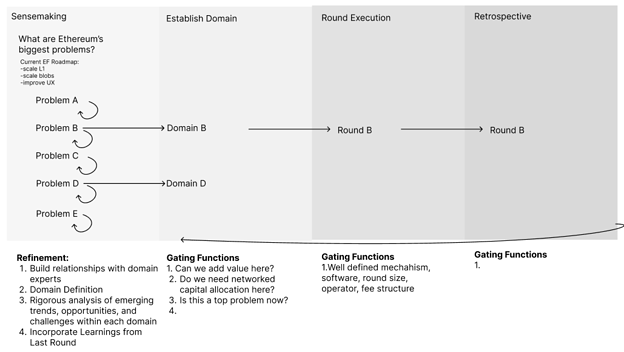IMPORTANT - This is Owocki’s vision for Gitcoin 3.0. Digest it, debate, it fork it, make changes. Nothing is official until ratified by governance!!
TL;DR: Gitcoin’s future hinges on mastering Dedicated Domain Allocation to optimize resource distribution across specialized domains.
Gitcoin Grants WAS Quadratic Funding, now its DDA/multi-mechanism.
Dedicated Domain Allocation Defined:
Dedicated Domain Allocation (DDA) refers to the strategic, intentional distribution of capital and resources within clearly defined areas of expertise or sectors, leveraging tailored mechanisms to optimally support projects, experts, and initiatives that advance domain-specific outcomes.
Historical Context:
Gitcoin began as a pioneer in Quadratic Funding (QF), dedicated primarily to open-source software (OSS) and Ethereum ecosystem public goods. Our success in scaling QF laid critical groundwork for broader impact from GG1-GG23.
Moving forward, however, requires transitioning from a single-mechanism approach to fully embracing multiple mechanisms. To effectively do so, Gitcoin must master Dedicated Domain Allocation - as a router to move capital between .
Mastering Dedicated Domain Allocation:
-
Sensemaking:
Effective DDA begins with sensemaking: the ongoing, rigorous analysis of emerging trends, opportunities, and challenges within each domain, and the high level problem domain (Solving Ethereum’s biggest problems). By continually refining our collective understanding, Gitcoin ensures resources align precisely with real-time domain needs. -
Domain Definition:
Clear and accurate domain definition ensures resources are neither overly concentrated nor diluted. Gitcoin’s role includes establishing explicit boundaries, defining scope, and determining measurable outcomes that allow efficient allocation across clearly delineated areas. -
Cultivating Relationships with Domain Experts:
Deep engagement with domain experts is crucial. Gitcoin will actively build relationships with proven thought leaders, practitioners, and innovators to refine domain understanding, ensure relevance, and leverage their expertise for optimal decision-making. -
Capital Allocation Within Domains:
Gitcoin’s final step involves deploying capital effectively within defined domains, using customized mechanisms suited to domain-specific needs. These can range from QF to retroactive funding, direct grants, venture-style investments, or other innovative capital allocation tools.
Weaving together the old and the new:
To fully master this transition, Gitcoin can weave together our existing strengths in Quadratic Funding (QF) and open-source software (OSS) expertise with emerging allocation methodologies.
Conducting a specialized QF/OSS funding round within the OSS domain will serve as both a practical application and a demonstration of how our existing domain knowledge integrates seamlessly with new approaches, enhancing our credibility and reinforcing our leadership in domain allocation.
Conclusion:
By transitioning from QF/OSS (single mechanism) to Dedicated Domain Allocation (fully multi-mechanism), Gitcoin positions itself as the premier capital allocator for solving Ethereum’s biggest problems in an increasingly networked world; a networked complement to the hierarchical Ethereum Foundation.
Mastering DDA ensures our continued relevance and amplifies our impact far beyond open-source funding, empowering diverse communities to achieve transformative outcomes for Ethereum.
Appendix A - GG24 domain allocation visual + schedule
Timelines
- April 2025 - June 2025 - Sensemaking about Ethereums biggest problems
- Building a framework for sensemaking to follow in perpetuity
- May 2025 - RFPs for software providers issued (Trad rounds, OSS Rounds)
- June 2025 - First Domain Announced
- July 2025 - Next Domains Announced, RFPs for software providers issued (any more experimental rounds)
- September 2025 - Testnet Rounds
- October 2025 - GG24
Appendix B - Tools that could run DDA
Well need to make a build vs buy decision here at some point.
- Questbook DDA [app]
- GrantsShips.Fun
- Custom tooling using notion or gdocs
- Custom tooling built by someone else.
- Possibly open rfp process, possibly find a vendor we like and work with them.
Appendix C - GPT generated reports on DDA best practices
